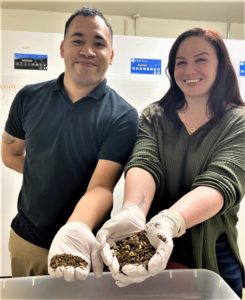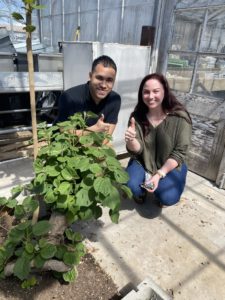Expanding opportunity, inclusivity through entomology
Grant increases STEM opportunities for Aggie ACHIEVE students
Christian Anguiano, a sophomore enrolled in Texas A&M University’s Aggie ACHIEVE — Academic Courses in Higher Inclusive Education and Vocational Experiences — program, never thought bugs were especially interesting.

But after a semester as an intern with Jeffery Tomberlin, Ph.D., professor, Texas A&M AgriLife Research Fellow, Presidential Impact Fellow and director of the Center for Environmental Sustainability through Insect Farming, CEIF, in the Department of Entomology, Anguiano has discovered how important insects like crickets, black soldier flies and mealworms could be to the future of livestock and human food systems.
Increased inclusive excellence within STEM
The CEIF was established by a grant from the National Science Foundation to explore insect farming for food and feed in response to climate change and shrinking food supplies. As the lead site for the center, the Texas A&M College of Agriculture and Life Sciences collaborates with Mississippi State University and Indiana University-Purdue University, as well as 34 U.S. and global industry partners.
Recently, the National Science Foundation’s Research Experience and Mentoring Program funded another grant designed to increase the number of intern positions within the CEIF for Aggie ACHIEVE students interested in science like Anguiano.
As a relatively new program for Texas A&M, Aggie ACHIEVE is a comprehensive transition program for students with intellectual and developmental disabilities, IDD, to enroll in college courses and prepare for employment. Students can be enrolled in Aggie ACHIEVE for up to four years.
Students who complete all four years will receive a Certificate of Interdisciplinary Studies from Texas A&M University. The program’s goal is to direct students toward interests and provide education that will translate into employment and improve their quality of life.
Aggie ACHIEVE explores science, research
At the beginning of the semester, Tomberlin gave Anguiano a crash course in insect species, entomology and concepts related to the center’s research.
COVID-19 complicated in-person activity, but over the semester, Anguiano completed assignments about insects and how they relate to food sustainability and produced research papers about insect farming’s emerging role in feeding the world over the coming decades. His final project was to develop a presentation and data-driven poster based on the research and present it to the class.
“Thanks to the grant’s expansion of opportunities for students with IDD, we have bridged our entomology and internship program with Aggie ACHIEVE,” Tomberlin said. “After this semester with Christian, I am excited about the future and getting more students involved.”
In coming semesters, Tomberlin said Anguiano will be fully integrated within the lab and take a leadership/mentor role to help other students navigate their assignments and prepare presentations for research poster sessions. He will also be paired with a graduate student to engage in more research within CEIF.
Federal grant expands internship spots for students with IDD
The grant will fund four new paid intern positions within CEIF for Aggie ACHIEVE students as well as four intern positions in Mississippi State University’s program.

Carly Gilson, Ph.D., Aggie ACHIEVE founder and faculty director and assistant professor of special education in the Department of Educational Psychology at the Texas A&M College of Education and Human Development, and Kelsey Gipson, job developer for Aggie ACHIEVE, are coordinating the program with Tomberlin. They said the CEIF offers students the ability to explore opportunities in science and research and spark interests they may not have realized otherwise.
Gilson and Gipson believe the Aggie ACHIEVE collaboration with CEIF and focus on STEM education and research will create a model that promotes high-quality, inclusive postsecondary opportunities for students with intellectual disabilities. The project’s overarching goal is to help students with academic achievement, independent living, integrated employment, self-determination and active community participation through science.
This goal aligns with the College of Agriculture and Life Sciences goal to increase inclusive excellence and provide a welcoming and productive scholastic environment.
Gilson said increased financial support for programs like Aggie ACHIEVE is changing the lives of students with intellectual disabilities by creating academic programming beyond high school. Universities, departments and faculty also realize these programs enhance teaching, classroom and campus experiences for all students.
“I am thankful for the internships at the CEIF because our students can take on research projects and go through the academic rigors of scientific processes,” Gilson said. “That is important because this is not an outreach program for Texas A&M; it is an academic program where the goal is for the student to get an education, not just an experience.”
Celebrating student success
Tomberlin, Gilson and Gipson are excited about expanding education and research opportunities for Aggie ACHIEVE students within the Department of Entomology and the Center for Environmental Sustainability through Insect Farming. So far, the partnership has shown how Aggie ACHIEVE can collaborate with university departments and other academic institutions to create postsecondary education opportunities for an underserved population.
“The ultimate goal is for our students to discover or develop their passion and be employed alongside people with and without disabilities and transcend their abilities prior to entering the program,” Gilson said.
Gilson said Anguiano was a shy freshman when he entered the program. He had worked at H-E-B as a grocery bagger and, like many of the 68,000 Texans with intellectual disabilities, was being pigeonholed toward menial tasks.
The program has raised the expectations for his quality of life, she said. Beyond his work studies and internship at CEIF, he has become an active part of campus life, including organizing a 5K run with a student organization.
New possibilities for students, educators
Anguiano is a model student, Tomberlin said. He is engaging, takes constructive comments and corrects mistakes, and his effort and success have given Tomberlin a renewed perspective on teaching.
Tomberlin’s plans to offer Anguiano more responsibility in CEIF is part of his overall plan to create a hierarchy for his students, graduate students, incoming Aggie ACHIEVE students and future cohorts that promotes an environment that pushes individuals’ abilities.
“Carly and Kelsey experience this every day, but it is an awesome experience as a professor,” Tomberlin said. “Instructing him over the semester has reinvigorated me and given me a new perspective on teaching. It reminded me of when I was a new professor and that even small accomplishments or breakthroughs you experience with your students should be celebrated.”
Anguiano said he was unsure about the course at first. But he is excited about completing the semester and is looking forward to exploring entomology and learning more about the insect-farming industry CEIF research is studying.
The course has opened him up to new interests and possibilities. Completing coursework that took him out of his comfort zone – whether preparing essays or presenting his poster to strangers – has given him the confidence to embrace the unknown.
“I am not sure about being a leader or a mentor,” he said. “I don’t know much about that. But I am excited about learning more about Dr. Tomberlin’s lab and sharing what I’ve learned with the other students.”


